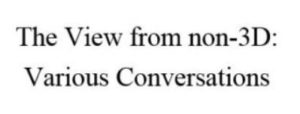
Thursday, November 4, 2010
8 AM. So what are the counter factors? What is the value and limitation and possibility of social reform, say?
If your society contains obvious injustices, if it squelches initiative, stunts potential, breeds frustration, all of this is added to the difficulties that arise. Remove any difficulty and the way gets easier, right? But – how can you tell what is the right thing to do? Sometimes it is clear, and yet sometimes what is clear is clear mostly because your vision is single. How do you go about correcting the world’s injustices without creating greater injustices both directly and indirectly? The problem is harder and more involved than it may at first appear.
The people who overthrew the czarist empire knew what they were trying to overcome – the dead hand of the past in many forms. But would they have been as happy to see the Czar deposed if they had known that he would be replaced first by chaos, then by civil war, then by Lenin, then by Stalin? Would they have been happy to learn that they were creating the conditions that would lead to fascism, and Nazism, and an even worse world war than they were trying to escape? It is not possible to envision even the intermediate-term consequences, let alone the long-term consequences, of one’s actions.
The liberals of the 1930s who wanted the United States actively engaged against the obvious evils of Nazi Germany and Fascist Italy – would they have been so undivided in their political certainties if they could have foreseen the Cold War and the arms race and Imperial America? And the same questions could be put rhetorically to any and every partisan of any and every cause – did your triumphs bring peace on earth and the regeneration of man, or did every intensification of the struggle lead to further intensification, with the goal ever receding?
This isn’t to say do nothing. Was it wrong to free the slaves? Was it wrong to enfranchise Southern blacks in the 1960s? Was it wrong to destroy Hitler and outlast Communism in Russia? But don’t expect that the force that intensifies tensions and hatreds (because it brings up fears) is going to lead where it can’t.
Dr. Jung pointed out somewhere that consciousness tends toward goals, leaving the opposites of those goals to fall out of consciousness, which leaves them powerful and autonomous. Hence, poetic justice but hence, also, the turning of good intentions into bad results.
“Resist not evil” was rooted in just that understanding of unseen forces. If you wish to overcome something, you must transcend it, not oppose it. John Lewis’s way leads toward reconciliation. Stokely Carmichael’s way leads to the stoking of more racism, more violence.
Nice pun.
Not so nice a result, though.
Dr. Jung, I think it was, said that symbols have no opposite, hence do not create the split in consciousness that logic does, or dialectic. What’s symbols should we (or might we) use to create greater wholeness in ourselves and in society?
Each person will find symbols appropriate to his or her inner state. Only try to find symbols of wholeness, not of partisanship, or the symbols will do more harm than good. The Nazis united behind the swastika, after all. It gave them great strength, and naturally built up opposition to them proportionately. The peace sign, the green flag, anything that is meant as a banner in a war will have the same immediate effect, and the same longer-term counter-effect. Think what happened when the American flag was first rejected by the left then adopted by the right within the past 50 years. It ceased to be the symbol of unity even internally, and of course its extension overseas has created an ever-greater opposition, just by being there.
If you must march beneath banners, fine. Just don’t think you’re bringing better times with you. Maybe Armageddon is fought, not for the Lord, but because the Lord is not among the warriors. Or to put it another way, perhaps battles are fought chiefly in the name of all-transcendent realities that cannot be so misappropriated without correspondingly great damage automatically flowing as consequences.
And yet it is true that evil exists.
Yes, and it is true that the chief cause of problems is solutions, as the newsman said whom you like to quote. “Resist not evil” does not mean, put up with it. It means, transcend it. John Lewis showed you the way, and Gandhi before him, and Henry Thoreau in principle before them. If you must put your body on the line, you must do so for the good of all – of those whose demons are leading them to play the oppressor as well as those whose demons are leading them to play the oppressed – or you will be at best neutral and may easily become an evil yourself, either in your actions or in the forces you help liberate.
There is a difference between an anti-war movement and a peace movement; between an anti-segregation movement and an integration movement; between anything aimed against, which means outward, which means proceeding from rejection, which means ultimately proceeding from fear, on the one hand, and the only true opposite which is love.
Love in action seems so weak and frail, and cannot be successfully resisted because it incorporates that which struggles against it.
Thank you for all this.